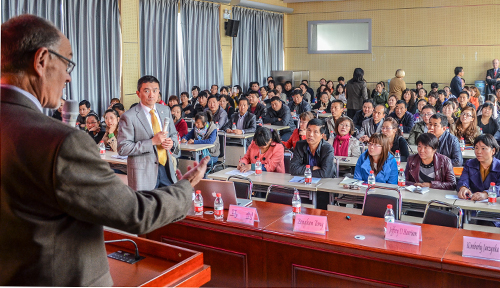When you have the sixth best primary care program in the country, it’s not surprising that you are invited to speak about your excellent program.
But China?
That’s quite a road trip.
For the past five years, the UNMC Department of Family Medicine has made the nearly 7,000-mile trek to China to educate Chinese physicians on the UNMC way of doing family medicine.
See sidebar: The traveling team
Amazingly, the message is getting through.
“In 2008, they had no concept of what a family medicine physician was,” said Jeff Harrison, M.D., professor of family medicine and one of seven Nebraska family physicians who went to China this year. “They now are practicing as family medicine physicians. They have made huge progress.”
This year, the UNMC team’s goal was to introduce the patient-centered medical home (PCMH) and demonstrate how it can reduce costs and improve quality.
Chinese physicians see between 100-120 patients per day compared to 30 patients for the average U.S. physician.
Obviously, with this incredible patient load, Chinese physicians can only spend a few minutes with each patient. There is little time for counseling or helping them manage a chronic disease such as diabetes, chronic obstructive pulmonary disease, heart disease or stroke.
That’s where the PCMH comes in.
The PCMH works as a team. The physician shouldn’t have to do all the work. Nurses and other staff members can play a key role in ordering prescriptions, educating patients, and helping them manage chronic disease.
On this trip, the UNMC family medicine team made more than 30 presentations to health professionals in three Chinese cities – Shanghai, Xi’an and Xianyang.
“It’s a little bit like being a cheerleader,” Dr. Harrison said. “They’ve come a long way. Now, we want to get them to take the next step – to use the medical home and do a better job of managing chronic diseases.”
The Chinese have always made specialists the focus of their medical care. The Chinese national government wants that to change. The government is bringing in experts from around the world to teach the family medicine model.
Dr. Harrison said research shows that family medicine care is more cost-efficient and effective than going to a specialist.
Family medicine can lower costs by 33 percent, he said, and people are 19 percent less likely to die.
It’s a message that needs to be spread – even if it requires a 7,000-mile road trip.
